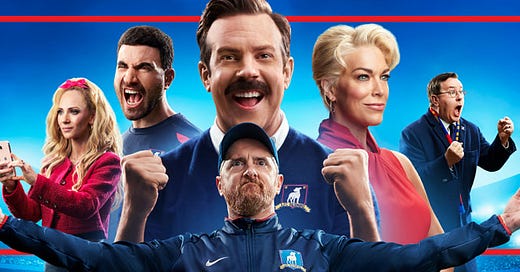By Tim Wilson
Have you seen the Apple TV series “Ted Lasso”? If not, you absolutely should.
I realize I’m a little late to the game in asking about a series that ended this summer after three years. I didn’t start watching it myself until after the first two seasons and didn’t finish until about a month ago.
Now I know why so many people were talking about the show with the wacky plot that began streaming about six months into the COVID pandemic. Some may call it sappy. Others say it was silly. Call it what you will, but “Ted Lasso” the series and Ted Lasso the character were just what people needed – an example of unwavering optimism in the face of a daunting and depressing situation.
The lessons from Ted Lasso are about so much more than the plot, which was pretty crazy. If you haven’t seen it, here is the story line in a nutshell: The owner of a perpetually struggling soccer team in the English Premier League hires an American college football coach to take the reins of the team in a sport he has never played and knows next to nothing about. As I said, the concept is a bit nutty but don’t let that dissuade you from checking it out.
You don’t have to be a soccer fan or even a sports fan to connect with this show. It’s not really about soccer or sports. It takes viewers on a voyage of discovery by the various characters and challenges the characters and the audience to recognize first impressions are often the last thing to judge others by. It’s about finding and bringing out the best in others and giving the other guy the benefit of the doubt. It’s also about discovering the best of ourselves despite what we’ve been told by others or even told ourselves.
Coach Lasso takes his team, the owner, the media and the fans on a trip they never imagined a “wanker” could lead. From the get-go, this ever-smiling, maddeningly and unfailingly positive Kansan simply asks all of them to believe. But for Ted, this is not simply the means to the end of winning. That’s merely a hoped-for byproduct that may come by getting his players to believe in themselves and each other.
In the course of this journey with Ted, the characters and the audience are reminded that we are all dealing with stuff nobody else knows about so we should cut others and ourselves some slack. None of us start out being all we can be, but we can change or at least evolve. Achieving this requires a willingness to look deep inside and do the hard work it takes. Short cuts inevitably leave us coming up short.
Don’t get the idea the cameras filming Ted Lasso were fitted with rose-colored lenses. There are ups and downs but thankfully they are accompanied by lots and lots of laughs. The writing is brilliant. You really don’t want to miss a word of dialogue, which isn’t always easy with Ted’s twang and a variety of British and other accents.
Do yourself a favor. When you sit back and watch “Ted Lasso”, let yourself partake of the belly laughs but at the same time open yourself up to Ted’s surprising genius. There are so many messages weaved into the humor that we can apply to our own lives. Here are four important ones:
Sometimes when things are going well, we can find a way to be at our absolute worst. Periodically make yourself look in the mirror.
In the worst of times, our best selves can come out to save the day. Give yourself that chance.
When we do experience success, it’s a lot more fun and more satisfying to share it unselfishly.
When things go wrong, be a goldfish. If you don’t know what this means, it’s time to watch or rewatch the show.
I’m not ignorant of the fact this is just a goofy TV show with an implausible plot. But the messages are genuine. So, if you haven’t already, give Ted Lasso a try, because as Trent Crim once said, “If the Lasso way is wrong, it’s hard to imagine being right.”
About the author: Tim Wilson is a lifelong resident of Massachusetts. He is passionate about his family, Marquette University, bicycling and all Boston sports.





